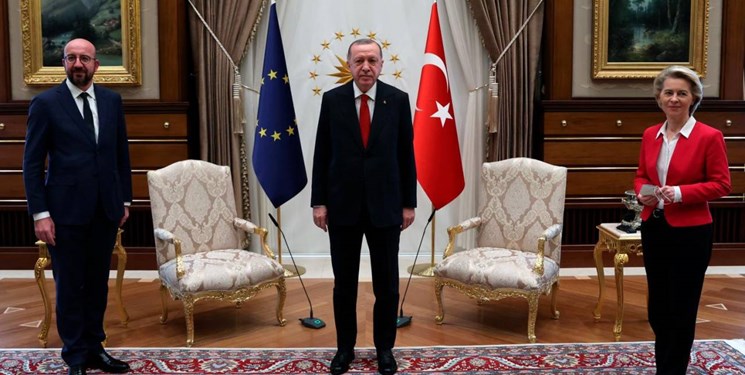Siamak Kakai, speaking in an interview with the website of the Strategic Council on Foreign Relations on the process of Turkey’s EU accession, noted: The story of Turkey and the European Union and the negotiations between the two sides is more like a marathon that weighs heavily on Ankara. Negotiations between Turkey and the European Union, with an aim of joining the country with EU, continued for more than a decade, but Turkey’s aborted coup in July 2016 and Erdogan’s change of domestic policy began to widen the gap between Brussels and Ankara.
Pointing to the differences between Turkey and the European Union, which in recent years have led to a stalemate in the negotiations process of the two sides, can be divided into two categories, said Kakai, adding: The first is the EU’s criticism of Turkey’s political atmosphere, which includes internal pressure on the media and political activists in Turkey, and in other words, the closure of Turkish politics atmosphere after the aborted coup, which prompted the EU to suspend membership talks.
He continued: Meanwhile, for Ankara, this move by the European Union, although not unexpected, is very worrying. The issue has escalated to the point where various EU institutions have been talking about removing membership talks from the agenda.
According to the expert on Turkey affairs, some experts believe that in the years when membership talks were in place, it was clear that there was a long gap between the EU and Turkey; that is to say, major EU countries such as Germany and France have never been happy with Turkey. There were even occasional side arguments that Turkey should relinquish its membership in the Union and turn into a strategic partner for the union.
According to the expert on Turkey affairs, the second factor that was added to Ankara’s set of obstacles and political and economic challenges towards the European Union last year is the wide-ranging issue of migrants after the developments in Syria and the arrival of large numbers of asylum seekers in Turkey, estimated between 3 to 4 million people.
Further elaborating, he said: We have witnessed that the Turkish government use immigrants and asylum seekers cards against the European Union. That is to say, whenever there was a challenge between European countries and Ankara on various issues, Ankara would open the doors for immigrants to enter European countries and a large number of asylum seekers would depart to Europe via Turkey. This issue somehow, targeted the EU’s social security and posed a serious threat to the extent that European countries were forced to pay an annual budget to Turkey to house Syrian migrants.
Kakai, referring to the EU current pressures on Turkey that, for taking away the talks, relate to the mentioned issues, he said: Brussels is now trying to take Turkey out of the European sphere and give the negative response to Erdogan. In fact, the EU’s target is that Ankara should forget the talks on joining the EU accession.
Commenting on the consequences of the EU move and the impact on Ankara’s policies, the expert on Turkey affairs said: This issue may lead to further political frustration in Turkey and would lead it further towards the East. In particular, relations between Turkey and the United States and Europe over other issues such as the S400 system and military relations with Russia and military adventures in the surrounding areas have increased tensions. Such issues will also strain Turkish-European relations in the Eastern Mediterranean, in the Caucasus and elsewhere.
According to Kakai, EU pressure on Turkey may also have a negative impact on the country’s economic situation, which is currently facing a currency crisis, and this will have its impact on Erdogan’s political position and the social base of the Justice and Development as well.
In conclusion, he said: Of course, it must be said that the Turks had separated their path from Europe many years ago and did not have much hope for the outcome of the accession talks. Perhaps for this reason now this issue would not have much change in the nature of Ankara’s foreign relations with the West. However, regardless of the differences between Turkey and the European Union and the United States, the issue of Turkey’s presence in NATO is important for European countries, and this in itself is a confidence coefficient for Ankara.










0 Comments